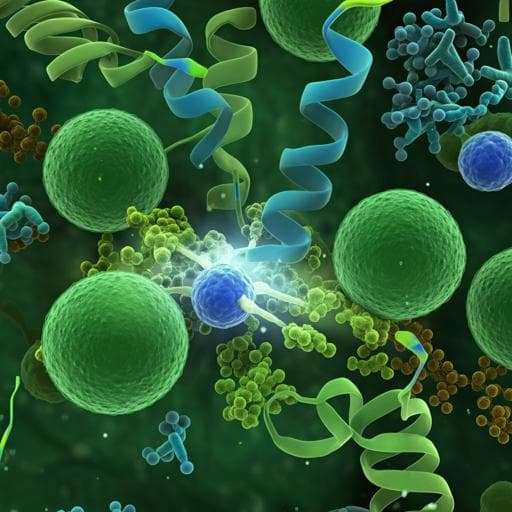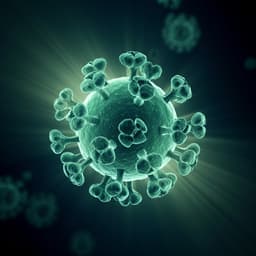
Medicine and Health
New AKT-dependent mechanisms of anti-COVID-19 action of high-CBD *Cannabis sativa* extracts
B. Wang, D. Li, et al.
The study addresses whether high-CBD Cannabis sativa extracts and their components can reduce SARS-CoV-2 host entry and inflammatory responses relevant to COVID-19. Context: Severe COVID-19 involves cytokine storm (notably IL-6 and TNF-α) and viral entry via ACE2 and TMPRSS2. While vaccines exist, effective therapeutics remain limited. Cannabinoids have reported anti-inflammatory properties, and prior work by the authors showed certain cannabis extracts downregulate ACE2, IL-6, and TNF-α in tissue models. Purpose: to elucidate mechanisms by which high-CBD extracts modulate ACE2/TMPRSS2 and inflammatory mediators (COX2, IL-6, IL-8), with focus on AKT signaling and miRNA-mediated post-transcriptional control. Importance: Identifying host-directed, multi-target interventions could prevent viral entry and mitigate cytokine storm in COVID-19.
Prior literature establishes ACE2 as the SARS-CoV-2 entry receptor with roles for TMPRSS2 and NRP1. Severe COVID-19 is characterized by elevated proinflammatory cytokines (IL-6, TNF-α) and cytokine storm. Cannabinoids (CBD, THC) and terpenes have demonstrated anti-inflammatory effects via reductions in COX2, IL-6, TNF-α and NF-κB pathway modulation. Authors’ previous studies in 3D tissue models showed high-CBD cannabis extracts downregulate ACE2, IL-6, and TNF-α. Computational analyses have suggested miRNAs (including miR-200c-3p, let-7a-5p) may target ACE2/TMPRSS2. However, mechanistic demonstration of cannabis-derived agents regulating ACE2/TMPRSS2 via miRNAs and AKT, and their effects on cytokines in normal human cells, was lacking.
- Cell lines: Human lung fibroblasts (WI-38) and normal foreskin fibroblasts (BJ-5ta) as primary models; also HCEC, HEK293, HMEC, HSIEC for receptor profiling. Standard culture conditions in appropriate media with 10% FBS or specified supplements.
- Treatments: CBD, CBN, THC at 5–20 μM; high-CBD cannabis extracts (#1, #5, #7, #10, #45, #81, #98, #129, #132, #169) at 7–30 μg/ml; selected terpenes (PTWT1.2, PTWT2.2, PTWT3.1, PTWT4.1, PTWT5.1, PTWT6, PTWT7) individually and combined at concentrations matching their abundance in extracts; DMSO or methanol vehicle controls.
- Inflammatory stimulation: TNF-α/IFN-γ co-treatment (dose range; 10 ng/ml used for 24–96 h time-course) to induce COX2, IL-6, IL-8.
- Western blotting: Assessed protein levels of ACE2, TMPRSS2, COX2, IL-6 (immature and mature forms), IL-8, CB1R, CB2R, p65 and phospho-p65 (Ser536, Ser311), AKT1/2/3 and phospho-AKT1/2/3 (Ser473), IFNGR1, TNFR2; GAPDH loading control; ImageJ densitometry.
- qRT-PCR (mRNA): Quantified transcripts of ACE2, TMPRSS2, IL-6, IL-8, COX2 under various treatments; GAPDH normalization; triplicates; 2^-ΔΔCt analysis.
- miRNA qRT-PCR: Quantified miR-200b-3p, miR-200c-3p, let-7a-5p, let-7b-5p after CBD/extract treatments; RNU6-2 normalization.
- Bioinformatics: Predicted miRNA target sites in ACE2 and TMPRSS2 3′UTRs (TargetScanHuman 7.2).
- Luciferase reporter assays: HEK293 cells co-transfected with luciferase reporters containing wild-type or mutant ACE2 or TMPRSS2 3′UTRs plus miR-200c-3p or let-7a-5p mimics; firefly normalized to Renilla.
- Pathway modulation: AKT inhibition with MK2206 (80 nM, 2 h pre-treatment) during CBD/extract or TNF-α/IFN-γ±extract exposure; assessed effects on pAKT and target gene/miRNA expression. AKT1 loss-of-function using CRISPR/Cas9 KO plasmid followed by TNF-α/IFN-γ±extract treatment and qRT-PCR/protein analysis.
- Proliferation: MTT assays in WI-38, BJ-5ta, HSIEC cells treated with selected extracts to assess cytotoxicity/proliferation effects.
- Statistics: Two-tailed Student’s t-test; p<0.05 threshold; data shown as mean ± SD.
- CBD and specific high-CBD extracts suppress ACE2/TMPRSS2 proteins: • In WI-38 and BJ-5ta fibroblasts, CBD and extracts #1, #5, #7, #98, #129 downregulated ACE2 and TMPRSS2 proteins (Western blot; significance indicated with p<0.05 or p<0.001 in densitometry). Extracts #1 and #5 showed dose-dependent ACE2 reduction. • Despite increased ACE2/TMPRSS2 mRNA levels after extracts #1, #5, #7, #129 (and slight ACE2 mRNA increase with CBD), protein levels decreased, indicating post-transcriptional repression.
- miRNA-mediated post-transcriptional control via AKT: • CBD and extracts #1, #5, #7, #129 upregulated miR-200b-3p, miR-200c-3p, let-7a-5p, let-7b-5p in WI-38. • Luciferase reporters showed miR-200c-3p directly suppresses ACE2 3′UTR and let-7a-5p suppresses TMPRSS2 3′UTR; mutant reporters abrogated repression. • AKT inhibitor MK2206 blocked induction of miR-200c-3p (CBD, #1, #129) and let-7a-5p (CBD, #5, #129), implicating AKT in miRNA upregulation; miRNA inhibitors restored ACE2/TMPRSS2 reduced by CBD and partially by extracts (#1, #129).
- AKT and NF-κB signaling modulation: • Extracts variably affected pAKT1/2/3 and p65 phosphorylation. In WI-38, several extracts increased pAKT; in BJ-5ta they decreased pAKT. CBD/extracts reduced p-p65 (Ser536) in both lines, while effects on Ser311 were differential.
- Terpene contributions and combinatorial effects: • In WI-38, CBD, terpene PTWT1.2, combined main terpenes, and extract #1 lowered ACE2; most treatments (except THC and extract #1) lowered TMPRSS2. • In BJ-5ta, most components of extract #7 (except CBD, PTWT1.2, PTWT3.1) strongly reduced ACE2; CBD, CBN, THC, PTWT1.2, PTWT2.2 decreased TMPRSS2. • CBD plus PTWT2.2 produced additive suppression of ACE2/TMPRSS2; CBD plus PTWT1.2 did not show additivity.
- Anti-inflammatory effects in TNF-α/IFN-γ model via AKT: • TNF-α/IFN-γ robustly induced COX2, IL-6, IL-8 in WI-38 (dose- and time-dependent). Extracts #1, #5, #7, #45, #98, #169 significantly attenuated COX2 induction; #1, #5, #7, #169 selected for deeper study. • With TNF-α/IFN-γ, extracts #1, #5, #7, #169 suppressed IL-6 and IL-8 proteins and reduced their mRNA transcription; they also strongly curtailed COX2 transcription. • TNF-α/IFN-γ increased p65 Ser536 phosphorylation; extracts #7 and #169 suppressed this; all selected extracts restored reduced p65 Ser311 phosphorylation. • Extracts increased pAKT1/2/3 under TNF-α/IFN-γ; AKT inhibition by MK2206 prevented extract-mediated suppression of IL-6/IL-8 and led to transactivation; AKT1 CRISPR KO similarly rescued TNF-α/IFN-γ-induced IL-6/IL-8 despite extract #7, confirming AKT dependence.
- ACE2 under inflammatory conditions: • TNF-α/IFN-γ mildly reduced ACE2 protein; CBD and extracts #81, #129, #169 restored it; extract #5 further decreased ACE2; CBN and extracts #1, #7, #10 slightly lowered ACE2.
- Component analysis of inflammation: • CBD, CBN, THC, and selected terpenes differentially attenuated TNF-α/IFN-γ-induced COX2, IL-6, IL-8; THC markedly reduced IL-6/IL-8; CBD/CBN lowered IL-8 and mature IL-6 while increasing immature IL-6; combined mixtures and whole extracts (#1, #7) often outperformed individual components, suggesting entourage effects.
- Safety in normal cells: • MTT assays showed selected extracts did not impair proliferation of normal WI-38 fibroblasts (and other tested normal cells), indicating tolerability at tested doses.
The findings demonstrate that high-CBD cannabis extracts and CBD can downregulate SARS-CoV-2 entry factors ACE2 and TMPRSS2 and suppress key inflammatory mediators (COX2, IL-6, IL-8) relevant to COVID-19 pathogenesis. Mechanistically, CBD/extracts activate AKT signaling, which increases miR-200c-3p and let-7a-5p to post-transcriptionally repress ACE2 and TMPRSS2. Under inflammatory stimulation, the extracts both dampen NF-κB signaling (notably p65 Ser536 phosphorylation) and rely on AKT activation to suppress IL-6/IL-8 transcription. Luciferase and inhibitor/KO studies support direct miRNA targeting and AKT dependence. Terpenes, particularly PTWT2.2, contribute to ACE2/TMPRSS2 suppression, with additive effects when combined with CBD, highlighting potential synergistic formulations. Together, these results support a dual host-directed strategy—reducing viral entry points and mitigating cytokine storm—positioning specific high-CBD extracts as promising anti-COVID-19 candidates with favorable effects in normal cells.
High-CBD/low-THC Cannabis sativa extracts suppress ACE2 and TMPRSS2 expression and attenuate TNF-α/IFN-γ-induced COX2, IL-6, and IL-8 via AKT-dependent mechanisms, including miR-200c-3p and let-7a-5p-mediated post-transcriptional repression and modulation of NF-κB signaling. Select terpenes (e.g., PTWT2.2) and combinations with CBD can produce additive effects, suggesting optimized multi-component formulations may enhance efficacy. The extracts showed no adverse effects on proliferation of normal fibroblasts at tested concentrations. Future research should: (1) define optimal ratios of cannabinoids/terpenes for consistent activity; (2) validate mechanisms in stable KO systems and additional relevant cell/tissue models; (3) assess in vivo efficacy and safety; and (4) proceed toward clinical trials of standardized formulations for COVID-19 prevention/adjunctive therapy.
- Not all CBD-dominant extracts were effective, indicating activity depends on specific component profiles beyond the terpenes tested.
- Variability in plant growth conditions may alter extract composition and ratios, challenging reproducibility; standardized formulations are needed.
- AKT1 CRISPR KO achieved partial knockdown, potentially underestimating effects; stable KO lines are needed.
- Findings are from in vitro cell models; in vivo validation and clinical studies are required to confirm efficacy and safety.
- Differential effects across cell types (e.g., WI-38 vs. BJ-5ta) suggest context dependence that warrants broader tissue evaluation.
Related Publications
Explore these studies to deepen your understanding of the subject.







